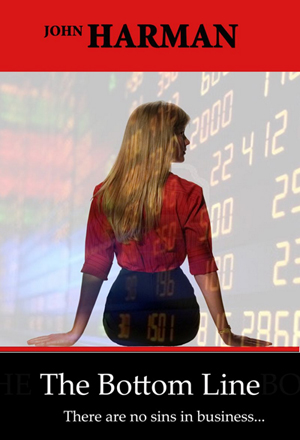The Bottom Line, a business thriller by British author John Harman, was originally published in 1991 and recently re-released as an e-book. Of ten Kindle reviewers, seven gave it five stars. This is admittedly a small sample size, but I will add my review to the hat and give it three.
The theme of The Bottom Line is hijacked from Shakespeare’s Macbeth, namely, unrestrained ambition and hubris lead inevitably to failure and ignominy.
 Richard Hoecheck is a hard-driving, psychopathic CEO “who will stop at nothing to achieve his bottom line.” Two of his minions—the beautiful financial executive Madelene Weybourne, and the creative, conflicted, and reckless Tony Oldbidge, who are surreptitiously having an affair—are inadvertent, willing codependents of Hoecheck. They facilitate his schemes to amass assets under the umbrella of his large conglomerate, an investment staple of many middleclass and wealthy families. Hoecheck is achieving high shareholder value through nefarious means (including insider trading, blackmail, and murder) but Madelene and Tony are initially exhilarated by the job’s frenetic wheeling and dealing. As they gradually become aware of the criminal roots of their boss’s empire, they conspire to bring him down.
Richard Hoecheck is a hard-driving, psychopathic CEO “who will stop at nothing to achieve his bottom line.” Two of his minions—the beautiful financial executive Madelene Weybourne, and the creative, conflicted, and reckless Tony Oldbidge, who are surreptitiously having an affair—are inadvertent, willing codependents of Hoecheck. They facilitate his schemes to amass assets under the umbrella of his large conglomerate, an investment staple of many middleclass and wealthy families. Hoecheck is achieving high shareholder value through nefarious means (including insider trading, blackmail, and murder) but Madelene and Tony are initially exhilarated by the job’s frenetic wheeling and dealing. As they gradually become aware of the criminal roots of their boss’s empire, they conspire to bring him down.
The novel is well written. Harmon’s development of both the major and minor characters is excellent. The backstories he creates for the characters along with the detail with which he paints their physical characteristics, tics, and idiosyncrasies bring them to life. His dissection of the various characters’ personalities to reveal the extent to which they are motivated by greed is truly masterful.
This otherwise excellent novel has four weaknesses, none of which should discourage a potential reader:
- The manner in which some of the major conflicts are resolved, as well as the dénouement, became apparent when I was only about a third of the way into the novel. As a result, the suspense was dissipated and much of my motivation for completing the novel is lost.
- One particular characteristic of Harmon’s style creates an interruption of the fictive dream. This is the grinding detail with which he describes the routes the characters take to get from where they are to where they want to be. If you are not familiar with the streets of London or the geography of England, these passages will be both useless and frustrating; I suggest you skip them.
- Late in the novel, when Tony is conspiring to rain on Hoecheck’s parade, he realizes that Hoecheck is on to him. Nevertheless, he continues to take reckless chances, acting as if he is bulletproof—which is not the behavior the reader would expect and is simply not plausible.
- Finally, I found the novel too long for the scope and complexity story being told. I think it would have packed a greater punch if it were about a third shorter.